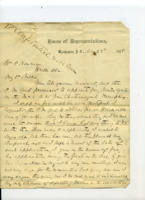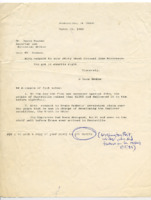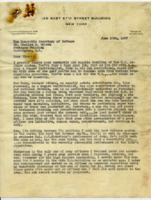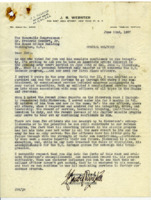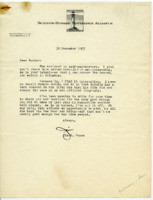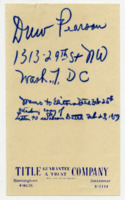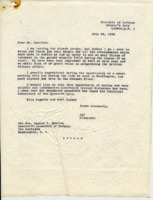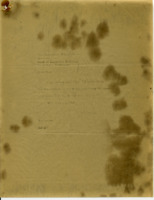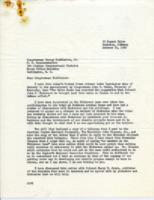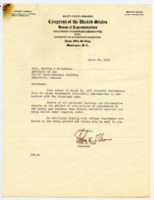
Browse Items (116 total)
Sort by:
-
Letter to William P. Newman from William W. Garth.
This letter marked "confidential read and burn," this letter is in response to a telegram sent earlier by William P. Newman. Garth states that he promised to appoint "Jno". He further writes that when "Jno" is notified of this, Newman is to say nothing as Garth does not with anyone to know he had anything to do with it. He writes that the only chance he has of defeating Moore in the convention is a "solid vote of Madison, Jackson, and Morgan." He concludes by stating that he wanted "simply to ask you" to help him obtain this "solid vote in Madison" and to put in a good word for him in Jackson as well. He reitterates that the letter is confidential and should be burned. -
Various correspondence with David Bowman from 1989 to 1991.
These letters to David Bowman, reporter and editorial writer, all pertain to Bowman's story about Colonel John Nickerson. The first letter includes foot notes and states that he sent a copy of the story to a Washington Post writer. The second letter contains additional information relating to the missile program that may be helpful for the story and a diagram of the original prototype for the Explorer I earth satellite. This set of letters also includes the original letter from David Bowman to Brig. Gen. Harold W. Nelson in which Bowman states he finally photocopied the published transcripts of Colonel Nickerson's court martial. Nelson's reponse follows thanking Bowman for sending the series on Colonel Nickerson. The final letter from Colonel Thomas W. Sweeney includes a working bibliography on the Nickerson case and invites him to visit the Military History Institute. -
Letter to Secretary of Defense Charles E. Wilson from J. Bancroft Webster.
Webster writes saying he thinks Wilson does a good job running the nation's defense system and because of that, Webster asks Wilson to evaluate Nickerson's performance of duty and would feel "thoroughly disillusioned to see such a 1st class officer sacked." -
Letters from J. Bancroft Webster.
Webster sends three copies of the same letter to Congressman Frederic Coudert, Jr., Senator Irving M. Ives, and Secretary of the Army Wilber M. Brucker, asking them to take "an immediate active interest in the pending army court martial" of Colonel John C. Nickerson. He testifies to Nickerson's character and his value to the national defense system. -
Letter to Robert K. Bell from Jim G. Lucas.
Lucas writes concerning an enclosed document and thoughts regarding Colonel Medaris and the Nickerson case that had closed earlier that year. He closes by thanking Bell and his wife for their hospitality during his last stay in Huntsville. -
Contact information for Drew Pearson.
Handwritten contact information for Drew Pearson. Pearson was the journalist whom make Nickerson's classified documents public. -
Letter to Donald A. Quarles from Alexander.
Alexander writes to thank Quarles for making the arrangements that allowed him and his party to "see so many things of interest in the guided missile field." He adds that Lieutenant Colonel Nickerson was very "helpful and informative". -
Letter to Ray H. Jenkins from Estes Kefauver and enclosed copies of letters.
Kefauver writes to Jenkins stating that he has enclosed the letter from the Department of the Army regarding the Nickerson case. The following letter addressed to Senator Kefauver is from Major General J. H. Michaelis. In it Michaelis writes that after consideration, the disclosure of certain documents is "too minimal to justify directing or advising the convening authority to drop the charges." He also writes that non-judicial punishment would be "legally objectionable" as Nickerson's offense is not minor. The last letter states the same regarding the dropping of the charges. -
Correspondence between George Huddleston, Jr., Lieutenant General Edward M. Almond, and Carl Vinson.
Almond writes to Huddleston in an attempt to get Nickerson brought back from exile in Panama. Huddleston agrees with Almond in his response and says he will do his best to advocate for Nickerson's testimony on the missile program and will bring the matter to the attention of the Chairman, Honorable Carl Vinson. Huddleston's following letter of January 25, 1958 states that Carl Vinson does not believe having Nickerson as a witness is advisable. Huddlestone attaches a copy of Vinson's letter that explains this. Almond writes in response to the decision with his thoughts on the matter and believes that "all service officers will step gingerly in their testimony" so as not to "stick their necks out as General Gavin and Colonel Nickerson have already done." -
Letter to the defense counsel from John E. Moss.
Moss writes in response to the defense counsel's request of March 25, 1957 for information from the House Government Information Subcommittee. Moss states that all published hearings and reports on the subject are being mailed separately.
